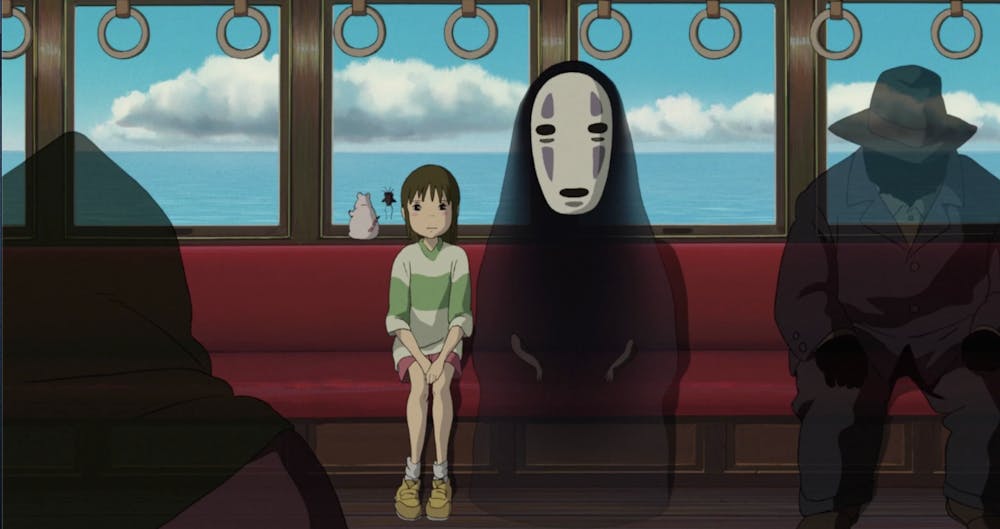With his 2001 film “Spirited Away,” Hayao Miyazaki set out to make a film for 10-year-olds, but wound up reaching everyone who has ever been a 10-year-old. In many ways, the animated classic is an affectionate tribute to childhood, and may even be more fitting for adults than 10-year-olds, as those who are no longer children hold dearer the vividness of childhood days than those still living them.
The movie begins as 10-year-old Chihiro rides on the way to her new home with her mother and father. Shortly after her father takes a shortcut route, a tunnel stops the car from going forward. Chihiro’s parents step out of the car and decide to enter the tunnel to see what lies on the other side despite Chihiro‘s misgiving. One thing leads to another, and her parents are turned into pigs. On her mission to save them, Chihiro learns to navigate this mysterious world, all the while encountering a myriad of characters — dragon boy Haku, twin witches Yubaba and Zeniba, boiler man Kamaji, bathhouse girl Lin, silent ghost No-Face and giant baby Boh, each unique and unforgettable.
Remembering one’s name is a major theme in the story. After Chihiro signs a work contract with Yubaba, the overseer of the bathhouse, Yubaba takes the second kanji (character) of her name Chihiro (千尋) and leaves Sen (千) as the protagonist’s new name in the spirit world. Chihiro then unlearns her real name, only to recall it after Haku gives her the card she brought into this world, which has her name on it. Haku then warns her, if she forgets her name, she will never be able to return home. One’s name could be interpreted as a symbol for one’s true self, or one’s soul. All but Chihiro in the spirit world have lost their names, a parallel to the fact that in the bathhouse Chihiro works at, only she does not lust after the gold No-Face squanders. Toward the end of the movie, Zeniba’s quote, “Once you do something, you never forget, even if you can’t remember,” adds a new layer of meaning to the concept of keeping one’s name. Like the characters in the bath house who clothe themselves in vanity and greed, people long past the age of innocence never really forget who they were, they just need a gentle reminder, such as the card Haku gave back to Chihiro, to bring back their buried memory.
Another recurring motif in the movie is the train that runs on the sea surface. Chihiro gazes down at the train as it dashes by many times, spellbound by the mysterious nature of it. Where does it come from? Where is it headed toward? Chihiro’s curiosity toward the train reminds the audience of how children are constantly trying to make sense of the intricacies of the world around them. The train carries Chihiro to her final quest in the spirit world. A transformed Chihiro, courageous, responsible, loyal and ever so different from the timid girl in the beginning of the movie, sits peacefully on the train with No-Face — this is one of the most endearing epilogues in a coming of age tale.
Joe Hisaishi’s score in “Spirited Away” makes the movie even more immersive. Hisaishi is Miyazaki’s long-time collaborator, beloved by Miyazaki fans and piano lovers alike. The first few chords in his “One Summer’s Day,” the main score in this movie, immediately teleport viewers to the grassland between the tunnel and the village that transforms into the spirit world after dark. The bittersweet melody seems to contain all the laughter and tears Chihiro shed in this world. At the end of the movie, “Reprise” evokes the imagery of a crispy morning with the sun slowly rising, therefore bringing us to the final resolution of the story.
Twenty years after its initial release, the magical scenes and captivating story in Miyazaki’s “Spirited Away” still hold their allure, both for today's children and all of us who were once children. As someone who had not the patience and insight to finish the entire movie at the age of 10, but was quickly spellbound by its imaginative nature upon my second viewing, eight years later, I encourage you to visit or revisit Miyazaki’s spirit world, in remembrance of your inner child.
Get The Chronicle straight to your inbox
Signup for our weekly newsletter. Cancel at any time.
Katherine Zhong is a Trinity junior and local arts editor of The Chronicle's 119th volume.

